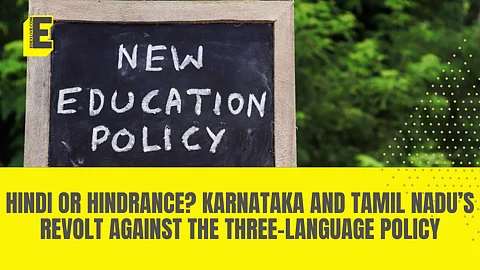

The Centre’s Three-Language Policy under the National Education Policy (NEP) 2020 has once again ignited a political storm, particularly in Tamil Nadu and Karnataka. While Tamil Nadu has long resisted the policy, opposition in Karnataka is rapidly gaining traction, with educationists and parents voicing strong objections.
Tamil Nadu’s unwavering resistance
Chief Minister MK Stalin has vehemently opposed the policy, calling it an attempt to impose Hindi on non-Hindi-speaking states. Tamil Nadu, which has adhered to a two-language formula of Tamil and English since 1968, has refused to implement NEP 2020.
In response, the Centre withheld Rs 2,152 crore in Samagra Shiksha funds, further escalating tensions. The Tamil Nadu government has labelled this move as “blackmail” and questioned its constitutional validity.
The three-language formula: A burden on non-Hindi states?
While NEP 2020 claims to provide flexibility in language choice, critics argue that, in reality, Hindi has become the default third language in many states. The policy mandates that students learn three languages, with at least two being native to India. However, many argue this disproportionately burdens students in non-Hindi-speaking states who must allocate additional time and effort to a third language.
Especially when they witness initiatives like the Union Government’s promotion of Hindi, including a Rs 50 crore allocation in 2019 for appointing Hindi teachers in non-Hindi-speaking states, reinforcing concerns. Critics point out the lack of similar efforts to promote south Indian languages in northern schools or Kendriya Vidyalayas (KVs).
The Karnataka backlash
Opposition to the three-language policy is intensifying in Karnataka. Educationists argue that the additional language requirement hampers students' ability to focus on core subjects like Math and Science.
On X (previously Twitter), the handle PLE Karnataka highlighted alarming statistics, posting: “Just in the year 2024 itself, Hindi has destroyed the future of 90,510 children in Karnataka. This doesn’t include lakhs of others who would have just survived to get passing marks by wasting a lot of effort/time which otherwise would have gone to useful subjects like Math/Science.”
This data, showing that over 90,000 students failed their Secondary School Leaving Certificate (SSLC) Hindi third-language exam, underscores the growing dissatisfaction with the policy. A campaign in Bengaluru in November 2024 called for an end to mandatory Hindi exams in Karnataka schools, arguing that students should not be forced to learn a language that does not align with their regional and professional needs.
Expert speaks: A call for bilingual education
EdexLive spoke with senior academician and developmental educationist VP Niranjanaradhya, who highlighted the disadvantages of the three-language policy.
“Imposing a third language is a burden on students. It reduces their ability to master their mother tongue and English efficiently. Many students failed in Hindi last year, which is a negative development and hinders their education. Instead, we should adopt a bilingual approach, making additional languages optional rather than compulsory,” he said.
Niranjanaradhya emphasised that children should have the freedom to learn multiple languages voluntarily rather than being forced into a rigid framework. “We need to review the three-language formula and evolve a model that best serves students' interests,” he added.
Beyond schools: Rising language tensions and Bandh in Karnataka
The linguistic divide in Karnataka has further deepened with a statewide bandh called by pro-Kannada outfits protesting an alleged assault on a KSRTC (Karnataka State Road Transport Corporation) bus conductor in Belagavi for not speaking Marathi. The incident has sparked outrage among Kannada organisations, who are demanding stricter action and better protection for Kannadigas in neighbouring states.
Deputy Chief Minister DK Shivakumar urged people to maintain peace and abide by the law, stating, “We will protect the interests of the state. However, I feel there is no need for a bandh.”
With security tightened across Karnataka and disruptions expected in businesses, educational institutions, and transport services, the ongoing language battle shows no signs of slowing down.
Should states have autonomy over language policy?
With both Karnataka and Tamil Nadu intensifying their resistance, the debate over India’s language policy is far from over, as the larger question remains: If education is a part of the Concurrent list, then should language policy in schools be dictated by the Centre alone, or should states have the autonomy to decide what serves their students best?
